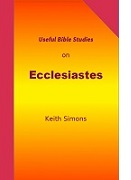Useful Bible Studies > Ecclesiastes Commentary > chapter 6
What is a good life?
Ecclesiastes 6:3-6
The author of Ecclesiastes is showing us how wrong popular opinions can be. People used to say that a man with many sons had a successful life. They still do say that a long life must be a good life. And in the grave, people said that a man írested with his fathersí (for example, 1 Kings 16:6).
So, the author tells a story about a man who seemed to have a good life. He had many children. He lived longer than anyone can imagine. But then he died and the truth about his life became clear.
The manís many children did not care enough about that man even to bury him. That would mean that wild dogs or birds would tear his body apart (1 Kings 16:4).
The only reason why the family did not care about the body was that it had no value. But such a family would fight like dogs for that manís possessions! It was a terrible end to what seemed an honourable life.
Of course people could not say that such a man Ďrestedí. During his life, the man would not rest if he saw such things! It seems even worse because these terrible things happened in public. When an unborn child dies, its whole life has happened in secret. That child never achieves any of the things that people consider great, good or honourable. It simply passes from life to death.
And that, of course, is where all people must go. Whether in a proper grave or not, their bodies return to the dust of the earth (Ecclesiastes 3:20). But it is different for their spirits. They must stand in front of God, who is their judge (Ecclesiastes 3:17; Ecclesiastes 3:21; Luke 16:19-31).
Next part: Rest for the soul (Ecclesiastes 6:7-9)
 Please use the links at the top of the page to find our other articles in this series. If you find these articles useful, you will like our book, available from Amazon.
Please use the links at the top of the page to find our other articles in this series. If you find these articles useful, you will like our book, available from Amazon.
You can download our articles on several Bible books, free, from our download page (including our free 1000+ page course book).
© 2019, Keith Simons.